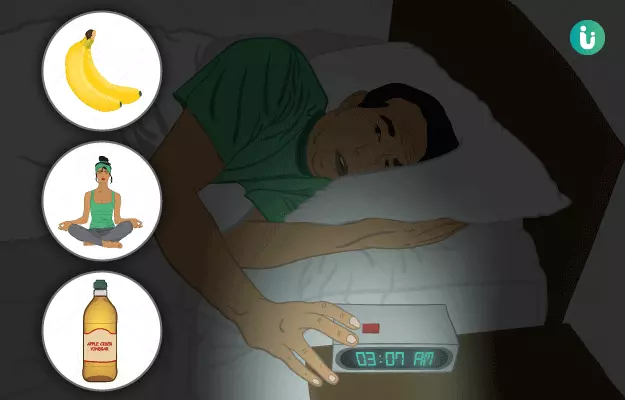Establish and follow regular sleep patterns
You may have heard of “help yourselves, God will help you”. So, the first step towards a solution should always come from you. Set a regular and definitive sleep schedule with a fixed time for waking up and going to bed. Follow it religiously, even on weekends or your free days. Don't alter your sleep-wake cycle by more than 1 hour. This will help your body to develop and maintain its sleep-wake rhythm.
The Indian Academy of Neurology recommends a simple strategy to help you fall asleep easily. It is known as “sleep restriction”. To make it simpler, let's assume you spend 8 hours in bed but you get only 5 hours of sleep. In this therapy, you are advised to spend only sleep hours (that is 5 hours as assumed) in bed initially. You can increase it by 15-20 minutes every week, if your sleep efficiency increases by 90% but if it does not, decrease it by the same until it does.
Additionally, avoid taking naps during the daytime. Hopefully, you will accumulate better sleep at night.
(Read More - Sleepwalking treatment)
Developing a bedtime ritual
- According to the National Sleep Foundation, developing certain habits before bedtime and avoiding some of them can help you get better sleep. It will also help you fall asleep faster. For this-switch off bright lights, get away from all electronic gadgets at least one hour before your bedtime. Use blacked-out curtains, eye shades and ear plugs. This will help you maintain a buffer from activities that cause excitement, anxiety and stress. This should induce deep and sound sleep.
- Another thing that you can do is start using an alarm clock for waking you in place of phone alarm. Even if you are using the phone’s alarm, keep it in another room. This has an additional benefit as you will have to walk to another room in order to switch off the blaring alarm. Physical movement will help you to wake up.
- Your bedroom should only be for sleeping. Avoid doing any other activities like eating or working in there. Do some stretching and take hot water baths before going to bed in order to relax your body. You can also try reading a book but ensure that it is a physical book and an e-book on your electronic device.
(Read More - Homeopathic Treatment for Insomnia)
Avoid alcohol, nicotine and caffeine
It is a well-known fact that consumption of caffeine, nicotine or alcohol can interfere with your sleep. Alcohol may induce sleep initially but later it will disturb your sleep cycle leading to poor quality sleep. Caffeine and nicotine act as stimulants and increases alertness making it difficult to sleep. If you cannot end your use of these two, try to avoid consumption before or close to your bedtime.
Stress management
Stress acts as a stimulus, in response to which, our body releases hormones that keep us awake. To avoid this, try the following stress management tips:
- Make time for yourself. Keep your work and “me” time separate. Try not to think about work or other things after going to bed. Focussing on your breath or counting your breaths may help with this. It gives your wandering mind something to concentrate on so it doesn’t think of the worries of the day.
- Try to calm and relax your mind at night. Making a night time routine or reading a book may help de-stress you. Do what you enjoy and distract you the best but don’t push yourself so much to make this a work too.
(Read More - Narcolepsy treatment)
Avoid heavy dinner
You may have read, ‘eat dinner like a beggar’. This adage is undeniably true because if you eat too much at dinner, it can make you feel uncomfortable while sleeping. Your stomach may grumble, and suffer from indigestion. Ultimately, this will hamper your sleep.
Avoid strenuous physical activity before bedtime
Exercise stimulates secretion of adrenalin and heightens your alertness. This makes it hard to relax and nearly impossible to sleep. Therefore, it is best not to work out close to bedtime. Restrict any strenuous physical activity at least 2-3 hours before hitting the sack.
Don't take naps during the day time
If you are one of those who finds it difficult to fall asleep at night, it may be your daily daytime naps that are to be blamed. Sleep fits naturally at night time as dictated by our circadian rhythm. Therefore, avoid taking long afternoon or evening naps. If you have to take a midday nap, limit it to 20 minutes only.
(Read More - Sleep problems in children)
Avoid taking sleeping pills
Don't use sleep medication regularly. Sleep medication may help you in the short term but in the long run, you may develop a dependency and addiction to it. Avoid over the counter (OTC) drugs as their prolonged use has also shown adverse effects like memory loss, irritable behaviour and heightened aggression. There is some research that suggests taking melatonin supplements (a hormone that regulates sleep/wake cycle) for insomnia but it should be done under strict medical supervision. Consult your doctor before taking any type of medication for sleep.
(Read More - Sleep and mental health)













